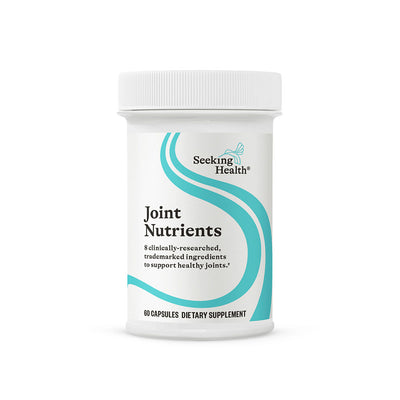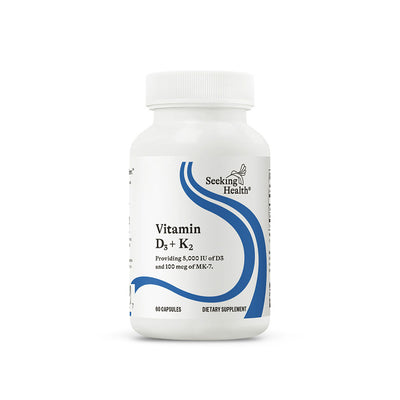
5 Reasons You Need Electrolytes + Easy Electrolyte Drinks

Have you experienced painful muscle cramps, either during the day or in the middle of the night? When you stand up from sitting, do you ever feel dizzy? Are you tired and experiencing brain fog? Do you follow a low-carb diet, or have you been intermittent fasting? Do you work out a lot? If one or more of these things are true, you may benefit from stepping up your electrolyte game.†
Adding electrolytes to your daily regimen can energize your metabolism. Whether you’re at the office, the gym, playing with your kids, transitioning to a low-carb eating plan, intermittent fasting, or settling in for a restful night’s sleep, electrolytes can help you can feel your very best.†
What are Electrolytes?

Electrolytes are a group of minerals that carry an electric charge, including:
- Sodium
- Chloride
- Potassium
- Calcium
- Magnesium
- Phosphate
- Bicarbonate
These essential minerals play a role in fundamental metabolic processes such as hydration, nerve signaling, and muscle innervation. The electrical charge that electrolytes carry is literally the spark of life! Without it, you wouldn’t have a thought in your head, nor would any movement be possible. When electrolytes are dissolved in body fluids (such as your blood, the cytoplasm inside your cells, or the interstitial fluid outside of your cells), they become ions that can conduct electricity. This is how electrolytes facilitate the physiology that benefits your brain, body, and overall wellness. (1)
Electrolyte Balance vs. Imbalance
Your body keeps electrolytes at certain levels, known as electrolyte balance. When the balance is disturbed, electrolyte-dependent systems operate less efficiently.
What can cause electrolyte imbalance?
- Inadequate dietary intake
- Dehydration or overhydration
- Fever
- Vomiting, diarrhea
- Sweating
- Certain medications such as diuretics
- Poorly controlled blood sugar
Symptoms of electrolyte imbalance can include:
- Fatigue
- Weakness
- Irregular or rapid heart rate
- Swelling or bloating
- Muscle cramping
- Mental tension
- Diarrhea
- Constipation
- Confusion
- And more
You might not have any symptoms with a mild imbalance. However, as electrolyte imbalances progress in severity, symptoms will become more pronounced, and the impact can be life-threatening. (1)
A simple blood test performed by your healthcare provider called an electrolyte panel can tell you if your electrolytes are out of balance. Or, since we get our electrolytes from the foods we eat and liquids we drink (the exception is bicarbonate which we make as needed), you can track your intake and increase or decrease your electrolytes as needed. Tracking is easy on an app such as MyFitnessPal. If you’re looking to boost your electrolytes, it’s easy to make your own electrolyte replacement drink, such as the refreshing and delicious Electric Lemonade Recipe below!
Which Foods Contain Electrolytes?
Sodium & Chloride
In nature, sodium and chloride are bound together in the form of salt. The recommended intake of sodium is less than 2,300 mg/day (this is equal to less than one teaspoon of salt a day). The recommended intake of chloride is set to correspond at 2,300 mg/day as well. If you’re getting adequate sodium, you’re also achieving chloride adequacy. Table salt and processed foods are our primary dietary sources of these minerals. (2, 3)
Sodium is the premier and yet most controversial electrolyte.
Conventional medical advice encourages us to reduce our sodium intake to less than 3,000 mg/day to support heart health. However, a growing body of evidence suggests that this may not be good advice for everyone. (4, 5)
An extensive study published in the New England Journal of Medicine found that people who consumed a moderate amount of sodium (between 3,000 to 6,000 mg/day) were healthier than people who consumed either more than this or less. The more recently published PURE study of over 90,000 subjects had similar findings. (6, 7, 8)
If you’re not sure how much sodium is right for you, consult your health care practitioner.
Potassium
Potassium is widely available in whole, unprocessed foods. Fruits, vegetables, nuts, beans, and dairy are all very beneficial sources. It’s little realized that meat is also a beneficial source of potassium. Although potassium deficiency is rare, healthy potassium levels are on the decline. This is due to lower amounts found in today's animal and plant foods and the displacement of potassium-rich foods from a diet high in processed foods. The recommended daily intake of potassium is 4,700 mg for adults and children aged four and older. (2, 9,10,11)
Magnesium
75% of Americans do not get enough magnesium in their diet.
It’s estimated that three-quarters of Americans do not meet the current magnesium recommendations of 420 mg for adults. (2) This is due to the declining mineral content in fresh, whole foods and an increase of processed foods in the diet. Additionally, dietary anti-nutrients such as the phytates in whole grains may bind to magnesium in the gut and inhibit absorption. Low intake, medical conditions, and food-medication interactions can interfere with magnesium adequacy as well. Beneficial sources of magnesium include leafy green vegetables, dark chocolate, fatty fish such as mackerel and salmon, avocados, bananas, nuts, seeds, legumes, and whole grains. (12, 13, 14)
Calcium
Dairy is our largest dietary source of calcium, however, leafy greens such as collards, turnip greens, and bok choy, fish with soft bones such as canned salmon, anchovies and sardines, and the soft ends of soup bones are all excellent, bioavailable sources. Many are not meeting calcium goals due to the displacing effect of an increased dietary intake of calcium-poor processed foods. Current calcium recommendations are 1,300 mg/day for adults, including pregnant and lactating women.(2, 15,16)
Phosphorus & Bicarbonate
Phosphorus and bicarbonate are two electrolytes we don't have to be concerned about from a dietary perspective. Phosphorus, also referred to as phosphate, is found in abundance in animal foods such as meat and dairy. The recommended intake is 1,250 mg per day for adult men and women. (2) We are actually more likely to get too much phosphate rather than too little since not only is it widely available naturally, but it is commonly found in processed foods as an additive. (17)
Bicarbonate can be consumed in its finely ground form as baking soda. However, it is made by the body as needed. A recommended intake for bicarbonate has not been established.
5 Reasons You Need Electrolytes Every Day
Healthy Brain & Nervous System Support†
Our every thought, from the simplest to the most complex, starts with a spark of inspiration or more literally, an ionic spark involving sodium, potassium, and chloride ions.
The activity of electrolytes alters nerve cell membranes, which allows information to be transmitted and received by cells in your brain and throughout your entire nervous system.† (18)
Healthy Muscles
After sodium, potassium, and chloride do their job of innervating your muscles via the nervous system, the electrolyte actions of phosphorus, calcium, and magnesium facilitate normal muscle function. Calcium promotes the quickness and force of muscle contractions, and magnesium expedites relaxation. This is true for all three types of muscles in your body, including the skeletal muscles attached to your bones, the cardiac muscle that is your heart, and the smooth muscles of your vascular system. Getting sufficient amounts of these electrolytes in your diet helps prevent muscle weakness and painful muscle cramping.† (19)
Healthy Hydration & Fluid Balance
It can be a surprise to learn that our bodies are about 60 percent water. What is all this water for? It makes up urine, blood, plasma, lymph, gastric secretions, and provides structural firmness to cells and tissues. Water helps lubricate joints, helps your body maintain a healthy temperature, and provides an aqueous environment for your brain to float comfortably around in. Water is also the environment where electrolytes hang out and work their physiological wonders.
If we don’t drink enough fluids or lose too much due to illness or activity, we can become dehydrated. Mild dehydration results in thirst, dry lips, a slight dryness inside your mouth, and lower darker urine output. Symptoms worsen as dehydration advances. But dehydration isn’t only a water loss problem. It’s accompanied by electrolyte losses, especially sodium, potassium, and magnesium. Even mild dehydration is not a desirable state to be in for too long. For proper rehydration, fluid losses and electrolytes need to be replaced.
Dehydration isn’t just a water loss problem. It’s accompanied by electrolyte losses especially sodium, potassium, and magnesium. For proper rehydration, fluid losses and electrolytes need to be replaced.
On the other end of the spectrum, fluid and electrolyte balance can be disturbed by drinking water to excess and creating a state of overhydration. This can result in a life-threatening condition known as hyponatremia. Athletes are particularly vulnerable. (20)
So, what's the right amount of water to drink? The often-touted advice that everyone drinks 8 cups of water a day isn't based on any evidence and has been debunked. The amount actually needed is based on lifestyle, health status, climate conditions, diet, levels of exercise, and other factors unique to you. Therefore, the right amount of water to drink is enough to quench thirst. (21)
Balanced & Happy Mood Support†
Many studies have shown magnesium to support calm and feelings of wellbeing. Calcium also supports a balanced, happy mood.† (22, 23, 24)
Acid-Base Balance
The acid-base balance or pH level of your body fluids must remain in a tight range for you to be healthy. For instance, your blood is kept at a slightly basic pH of about 7.35 to 7.45. For reference, a pH above 7 is basic or alkaline, and a pH below 7 is acidic. Bicarbonate functions to keep the body in acid-base homeostasis or equilibrium. (25)
Do You Need More Electrolytes?
Sodium, potassium, and magnesium are the main electrolytes found in electrolyte supplements. If you follow a healthy diet that supports adequate levels of electrolytes for your lifestyle and health goals, then supplementation may not provide any noticeable benefits. However, if any of the following rings true for you, adding an electrolyte supplement to your diet and correcting low levels may support your health.
Keto/Low-Carb Diets/Intermittent Fasting
Have you ever done a 30-day Paleo challenge, intermittent fasting, or started a keto diet and experienced symptoms such as fatigue, mental tension, low energy, or muscle cramps? Some of these symptoms are due to the brain's transition to ketones from glucose, but it's also likely that you are experiencing the effects of lower electrolyte intake. There are several reasons for this:
- Low-carb diets are naturally lower in sodium and chloride than standard diets because they contain more unprocessed foods.
- Low-carb diets result in lower insulin levels, which signals the kidneys to increase urinary output of water, sodium, and potassium. (26)
- It's more challenging to get enough potassium on low-carb or very low-carb diets such as keto because many potassium-rich foods are avoided, such as potatoes, carrots, and fruit.
SAD diet
Ultra-processed foods comprise almost 60 percent of the standard American diet (SAD), and processed food consumption is increasing worldwide. Consequently, intakes of nutrient-rich whole foods are decreased, including those that are beneficial sources of electrolytes. (27, 28)
Illness
Fever, vomiting, and diarrhea result in water and electrolyte loss, especially sodium, chloride, magnesium, and potassium.
Athletic performance
Exercise results in fluid and electrolyte losses through sweat and respiration. These losses can occur not only in hot environments but when exercising in cold environments as well. (29)
Although you won't find sodium bicarbonate in electrolyte supplements, some athletes find that supplementing with baking soda during intense exercise enhances performance by reducing exercise-induced acidosis.† (30)
Important note: If you have a medical condition that warrants limiting electrolytes, or you’re just not sure that electrolyte supplementation is right for you, seek advice from a trusted medical professional before supplementing.
Before supplementing with electrolytes, contact your medical professional if you have any of the following:
- Heart problems
- Poor kidney function
- You have been diagnosed as salt-sensitive
- You are at risk of hyperkalemia
- You are on medication that may alter electrolyte and acid-base balance such as diuretics or insulin
Seeking Health Optimal Electrolytes
Popular commercial sports drinks often contain a lot of sugar and additives such as preservatives and artificial colors. It's easy and so much healthier to make your own electrolyte replacement drink with Optimal Electrolytes by Seeking Health.†
Optimal Electrolytes contain no artificial colors and come in a variety of delicious flavors:
- Lemonade
- Berry
- Orange
- Unflavored
Lightly sweetened with monk fruit, each serving contains zero grams of sugar.
Optimal Electrolytes provides:
- Sodium
- Potassium
- Magnesium,
- Energy-supportive nutrients: Taurine, PeakATP ®, Creatine, and Niacin
Storage information: Keep unopened container in a cool, dry place until use. For freshness, use within 60 days of opening. Do not store this product in direct sunlight or at high temperatures.
Usage information: As needed, add 1 scoop to a glass or water bottle. Fill with 8 oz of filtered water. For best results, sip, hold, then swallow.
Do not take within 2 hours of bedtime. Use as directed by your healthcare professional.
Easy Electrolyte Drink Recipes
Need a great electrolyte drink recipe? Look no further. We've made "lemonade," but you can substitute any flavor of Optimal Electrolyte in this easy, refreshing, rehydration recipe.†
Electric Lemonade Recipe

5-Minutes, Vegan, Nut-Free
Serves 1 / Prep time: / Cook time: / Total time:
You’ll love this simple refresher that takes less than two minutes to make. It packs a bright lemony punch and the perfect ratio of electrolytes to optimize hydration and keep your metabolism running smoothly.†
Add in lemon slices for extra citrusy zing, raw honey for additional sweetness, or any herbs you desire such as basil leaves or mint. Serve chilled or over ice and enjoy!
Ingredients
- 1 scoop Optimal Electrolyte Lemonade
- 8 ounces Cold water
- Optional add-ins Lemon slices, basil leaves, mint leaves, sprigs of thyme, or any herb you desire
Instructions
- In a tall glass or a 16-ounce mason jar, stir Optimal Electrolyte Lemonade into the water until dissolved.
- Add the optional lemon slices, honey, and herbs, if desired.
Prefer to enjoy your electrolytes over ice? Try this refreshing Electrolyte Slushy Recipe.
Electrolyte Slushy Recipe
5-Minutes, Vegan, Nut-Free
Serves 1 / Prep time: / Cook time: / Total time:
You’ll love this simple and refreshing slushy electrolyte drink. Choose any flavor of Seeking Health Optimal Electrolyte that you prefer: lemonade, berry, orange, or unflavored. This slushy provides the perfect ratio of electrolytes to optimize hydration and keep your metabolism running smoothly all day long.*
Ingredients
- 1 scoop Optimal Electrolyte (any flavor)
- ½ cup Cold water
- 1 cup Ice
- Optional add-ins Citrus juice, fresh minced ginger, honey, or herbs such as basil or mint leaves
Instructions
- In a tall glass or a 16-ounce mason jar, stir 1 scoop of Optimal Electrolytes into the water until dissolved.
- To a blender, add the electrolyte mixture, the ice, and any optional add-ins such as fresh-squeezed citrus juice, honey, or herbs, if desired.
- Blend until slushy and enjoy immediately.
The Bottom Line
Many factors determine your individual need for electrolytes. Adequate dietary intake supports electrolyte balance and healthy metabolism and overall wellness. Be the best version of yourself with a glass or two of Electric Lemonade or any other electrolyte replacement drink made with natural and delicious Seeking Health Optimal Electrolytes.†
You can find Optimal Electrolytes and other high-quality, bioavailable supplements at SeekingHealth.com.
References
- https://www.ncbi.nlm.nih.gov/books/NBK541123/
- https://ods.od.nih.gov/HealthInformation/dailyvalues.aspx
- https://www.ncbi.nlm.nih.gov/pmc/articles/PMC4276982/
- https://pubmed.ncbi.nlm.nih.gov/22110105/
- https://pubmed.ncbi.nlm.nih.gov/3416162/
- https://pubmed.ncbi.nlm.nih.gov/31492503/
- https://www.nejm.org/doi/full/10.1056/nejmoa1311889
- https://www.thelancet.com/journals/lancet/article/PIIS0140-67361831376-X/fulltext
- https://www.ncbi.nlm.nih.gov/pmc/articles/PMC6181280/
- https://pubs.acs.org/doi/10.1021/acs.jafc.0c05139
- https://www.ncbi.nlm.nih.gov/pmc/articles/PMC3648706/
- https://www.aafp.org/afp/2009/0715/p157.html
- https://www.ncbi.nlm.nih.gov/pmc/articles/PMC5983041/
- https://www.ncbi.nlm.nih.gov/pmc/articles/PMC5610682/
- https://pubmed.ncbi.nlm.nih.gov/17490974/
- https://pubmed.ncbi.nlm.nih.gov/28193285/
- https://www.ncbi.nlm.nih.gov/pmc/articles/PMC3278747/
- Electrolytes - StatPearls - NCBI Bookshelf (nih.gov)
- https://cshperspectives.cshlp.org/content/10/2/a023200.long
- https://www.ncbi.nlm.nih.gov/pmc/articles/PMC5334560/
- https://onlinelibrary.wiley.com/doi/full/10.1111/j.1467-3010.2008.00724.x
- https://pubmed.ncbi.nlm.nih.gov/28654669/
- https://pubmed.ncbi.nlm.nih.gov/25827510/
- https://www.ncbi.nlm.nih.gov/books/NBK279022/
- https://www.ncbi.nlm.nih.gov/pmc/articles/PMC4670772/
- https://www.ncbi.nlm.nih.gov/pmc/articles/PMC5858534/
- https://bmjopen.bmj.com/content/6/3/e009892
- https://pubmed.ncbi.nlm.nih.gov/28193285/
- https://www.ncbi.nlm.nih.gov/books/NBK232870/
- https://www.ncbi.nlm.nih.gov/pmc/articles/PMC6544001/
‡
- This information is for educational purposes only. No product results are implied.











Leave a comment